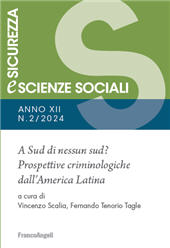Overconfidence, overliteracy : Online IDentity Theft stigma on the expert users
128-141 p.
Progress and digital transformation of the society have provided criminals with new opportunities to obtain and misuse personal identity information. The emergence and spread of online identity theft (OIDT) is an example of this. Very little is known about the profile, needs and experiences of people whose identity information has been compromised or misused. OIDT European victims often do not report the crime. But the negative experience hides important resistance in psycho-social perception. With the aim of analysing the impact of OIDT in different European countries, but also to profile victims, this article will show how: (1) OIDT affects also expert users; (2) the OIDT-related stigma creates a "constructed" fragility in these victims; (3) the higher the degree of confidence and digital literacy, the bigger the perception of stigma and the fear experiencing a secondary victimisation. [Publisher's Text].
Il progresso e la trasformazione digitale della società hanno fornito ai criminali nuove opportunità per ottenere e utilizzare in modo improprio le informazioni sull'identità personale. L'emergere e il diffondersi del furto di identità online (OIDT) ne è un esempio. Si sa molto poco del profilo, delle esigenze e delle esperienze delle persone le cui informazioni sull'identità sono state compromesse o uti-lizzate in modo improprio. Le vittime europee di OIDT spesso non denunciano il reato. Ma l'esperienza negativa nasconde importanti resistenze nella percezione psicosociale.
Con l'obiettivo di analizzare l'impatto dell'OIDT in diversi Paesi europei, ma anche di tracciare un profilo delle vittime, questo articolo mostrerà come: (1) l'OIDT colpisca anche gli utenti esperti; (2) lo stigma legato all'OIDT crei in queste vittime una fragilità "costruita"; (3) maggiore è il grado di fiducia e di alfabetizzazione digitale, maggiore è la percezione dello stigma e il timore di subire una vittimizzazione secondaria. [Testo dell'editore].
Ist Teil von
Sicurezza e scienze sociali : XII, 2, 2024-
Artikel aus derselben Ausgabe (einzeln erhältlich)
-
Informationen
ISSN: 2283-7523
KEYWORDS
- furto di identità online, crimine online, stigma, vittimizzazione secondaria, approccio alla cura
- Online Identity Theft, cybercrime, stigma, secondary victimisation, approach to treatment


